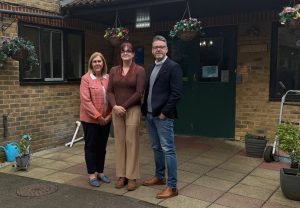Pailton boss champions manufacturing in the UK

MANUFACTURING has a great future in the UK despite the surging economies of China and India, according to the man who steered a Midlands engineering company to award-winning exporting success.
John Nollett, Managing Director of Pailton Engineering in Coventry, said: “There have been a lot of people who have pushed manufacturing to one side thinking it was dead, with the surge of China and India.
“But we have a fantastic manufacturing base here in the UK and some of the best engineering talent in the world. We believe manufacturing has a bright future here in the UK – despite what sceptics say.”
Mr Nollett should know: his company is a global leader in the design and manufacture of steering systems and is winning contracts from all around the world from companies attracted by its expertise, flexibility and speed.
Specialising in bespoke designs to customers’ specific requirements, Pailton diversified into the military market and European bus sector when its traditional trade in the construction and commercial vehicle sector started to dry up during the recession.
The move proved successful; the firm winning its largest-ever single purchase order, from military vehicle manufacturer Force Protection’s for parts for the Ministry of Defence’s new Foxhound light protected patrol vehicle.
Other customers include BAe Systems, the King Abdullah II Design & Development Bureau in Jordan, and Supacat, as well as JCB, Dennis Eagle, DAF Trucks, Scania and Caterpillar.
Mr Nollett said Pailton remained committed to manufacturing in the UK and he delights in the fact that around 70% of his company’s products are exported, showcasing British engineering around the world.
Such was Pailton’s performance that it was short-listed in the European Business Awards Import-Export category.
Mr Nollett added: “Manufacturing is so important: you have got to produce goods. If you are producing goods and exporting goods it is great for the GDP, job creation and wealth creation.
“If you can take people off the dole queues and put them back into a job, you reduce the burden on the government and create wealth and contribute taxes, it is an upward spiral and that is what we have got to focus on.”
Conscious of the heritage of engineering excellence both in the West Midlands region and the UK, Mr Nollett said he was also anxious that Pailton nurtured the next generation of engineers.
The company has run a successful apprenticeship scheme for the past 15 years; it has an extensive management training programme, and also supports employees undertaking degrees and masters qualifications.
Recently Mr Nollett was part of a 30-strong delegation to Westminster to see Business Secretary Vince Cable o lobby for more support for manufacturing businesses.
Mr Nollett said: “Manufacturing has been a ‘forgotten’ sector for a long time – and that needs to change.”
He isn’t the only one to be championing the sector that still offers the best hope for growth.
Andrew Essom, sales manager at Cradley Heath-based Rical Group, said: “The UK manufacturing sector has much to be optimistic about.
“Sector data suggests that Factory output grew at its fastest pace during December and has seen its biggest increase since the summer of 2011, The Manufacturing Purchasing Managers Index increased to 51.4 – a 15-month high.”
He said the West Midlands was without doubt championing UK manufacturing; a trend underlined by significant inward investment.
Rical Multiforms, a division of the Rical Group of companies, had, he said, seen a dramatic increase in enquiries for manufactured product including metal pressings and wire forms.
The business currently has a four-month enquiry backlog worth around £5m, while the rest of the group is also healthy with strong sales coming not just from the automotive components sector but from other component industries as well such as electrical and building-construction.
“This increase in activity is not only a real benefit to the very hungry automated manufacturing process that enables us to produce high volume components very competitively within the UK, it also increases the need to draw off the local talent within the area by increasing our need for skilled costing and project managers,” he added.








